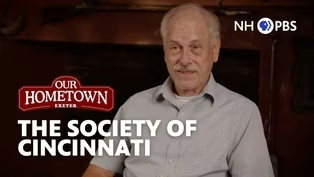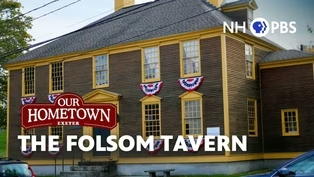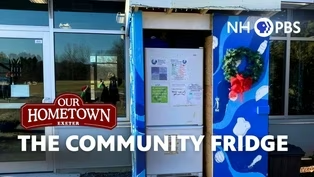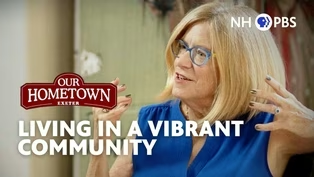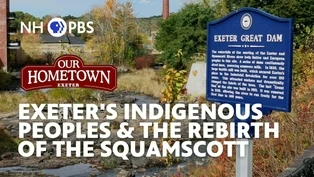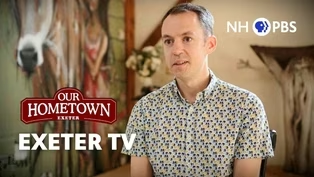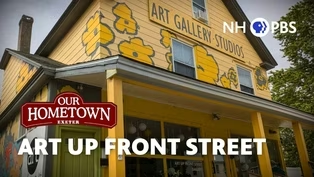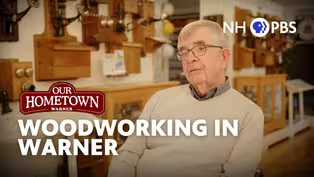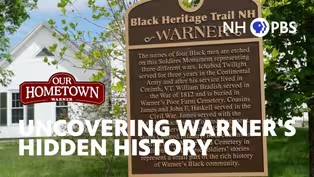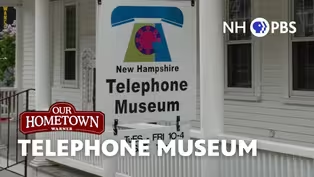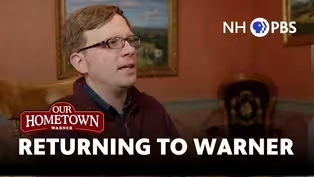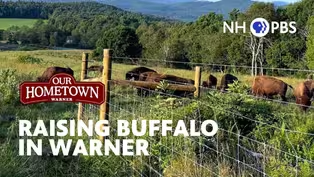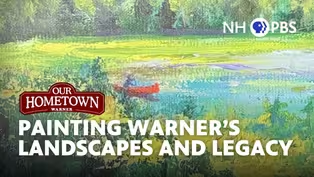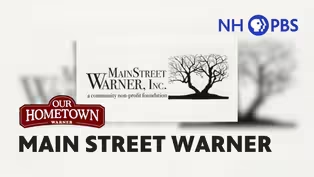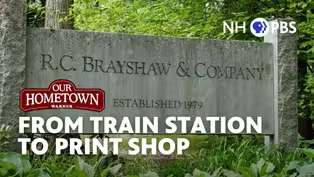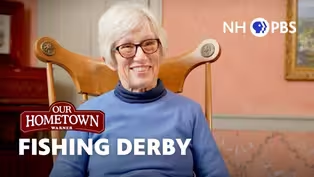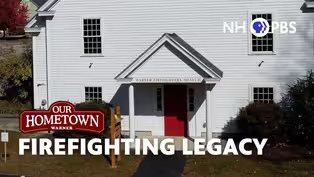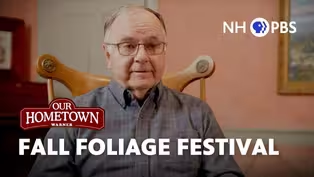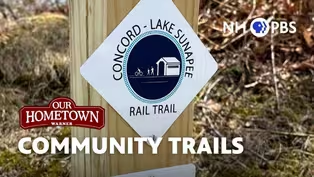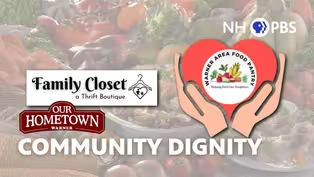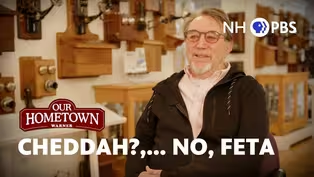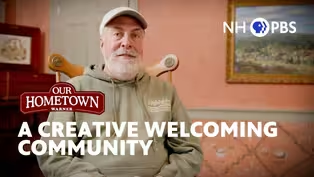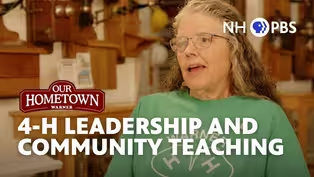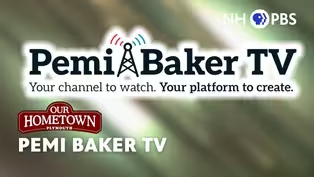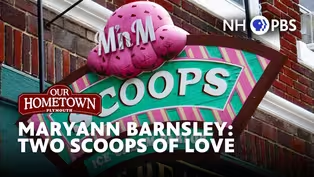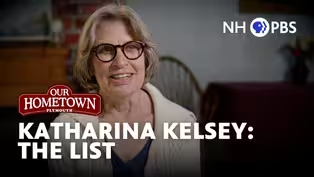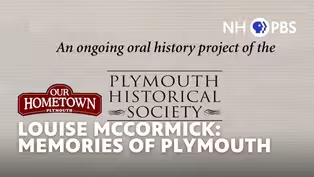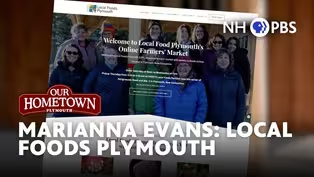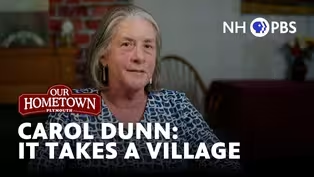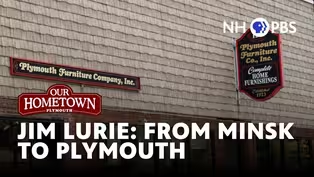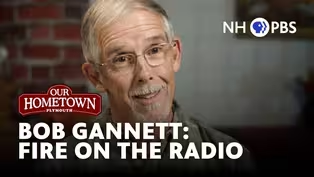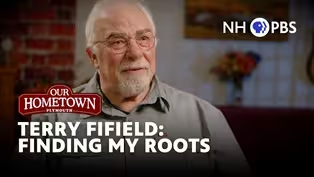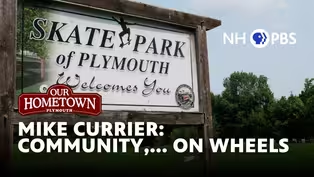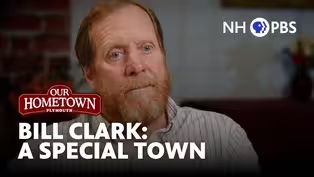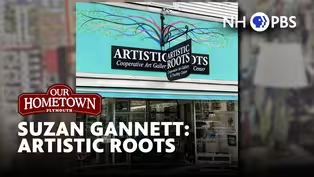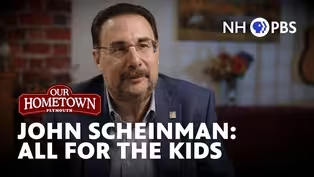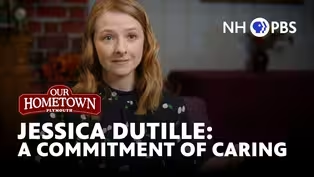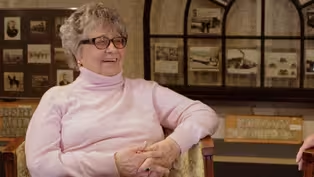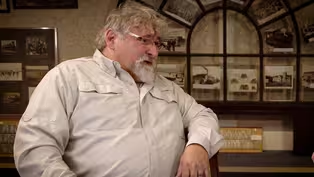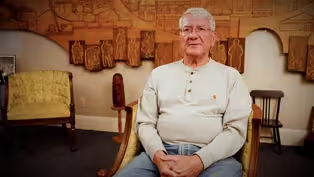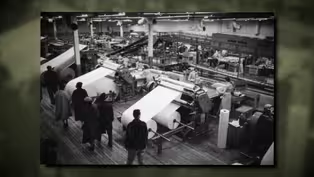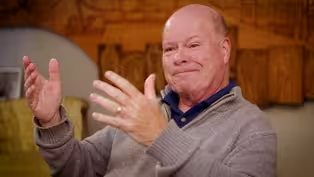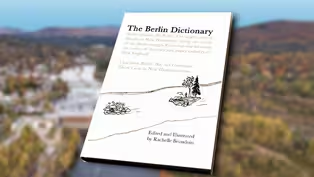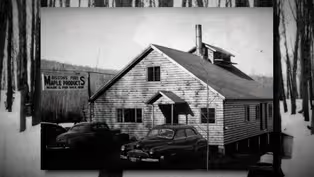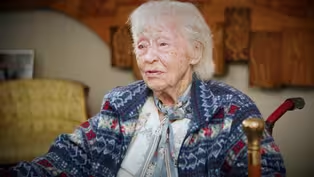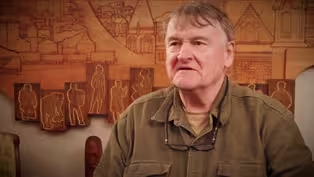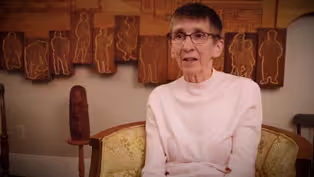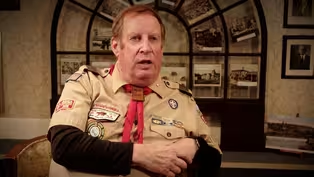Warner | From Train Station to Print Shop
Clip | 5m 56sVideo has Closed Captions
Jeremy reflects on the vibrant life surrounding Warner’s beloved train station.
Jeremy recalls when Warner’s train station was the town’s heartbeat—from ski trains delivering city-dwellers to local rope tows, to the summer vacations that inspired a lifelong connection to the community. A story of railways, roots, and how a whistle once brought Warner together.
Problems playing video? | Closed Captioning Feedback
Problems playing video? | Closed Captioning Feedback
Warner | From Train Station to Print Shop
Clip | 5m 56sVideo has Closed Captions
Jeremy recalls when Warner’s train station was the town’s heartbeat—from ski trains delivering city-dwellers to local rope tows, to the summer vacations that inspired a lifelong connection to the community. A story of railways, roots, and how a whistle once brought Warner together.
Problems playing video? | Closed Captioning Feedback
How to Watch
is available to stream on pbs.org and the free PBS App, available on iPhone, Apple TV, Android TV, Android smartphones, Amazon Fire TV, Amazon Fire Tablet, Roku, Samsung Smart TV, and Vizio.
The train station was the hub of the town.
It was the lifeblood.
It was the thing that when the whistle blew, everybody came running down to the station.
The old ski trains that used to come to town.
Right.
And they'd bring all the skiers out of the city, you know, up from Boston, the Boston, the Burlington Railway, railway would transport those skiers, you know, looking for that same kind of reprieve.
Right?
Looking to get away out into the wilderness.
There was a little rope tow and a ski hill right by the train station.
So you could get off.
You could go to the rope tow, you could ski.
There was little lodges and things in town.
But the train station was the hub of it.
Dick Brayshaw, the founder of RC Brayshaw & Company, used to come up to this area with his family and they would vacation up here, you know, every summer they would come up with the boys and, you know, he had, you know, fairly large family and would bring them up every summer out of, Long Island, New York.
And they'd come up here out of the city, get away from it all kind of thing, you know, the foothills of Warner.
And, they loved it up here.
And then, you know, back to the grind, back to work.
You know, he worked in the city, in the family, lived in Long Island, and, that was it.
Mom said, enough of that.
We're out of here.
New York in the 70s was a pretty, you know, rough place to be.
And and she said, nope, dad, this is no place to raise a family.
He was at the time, a foreman of a printing company.
And so, naturally, when he came up here, they said, where?
Where else do you want to be?
Then Warner, New Hampshire, you know, let's go where we love, you know, we love it up there.
That's where we want to spend all of our time anyhow.
And, little ol Warner down the road.
They had seen this dilapidated train station at the time.
Unfortunately, the train station had lived a few lives, had fallen out of use as a train station, and, was a bowling alley.
It was always kind of a hub in town.
It was kind of a funny place, you know?
And, they still had when the Brayshaws bought it, you know, at the time, it was totally out of out of use and in disrepair, the windows and things like that, you know, as you would imagine, you know, it had been several different things, but the the bowling pins and stuff like that were still there in the building.
All the little pin setters were in the building, and the Brayshaws had bought the building.
And actually shortly after they had bought it, somebody came along and knocked on the door and said, hey, do you still have those pin setters in here?
And, Dick and Fran said, yeah, yeah.
Why?
He says, oh, jeez, you know, I'd really I could use those.
And they said, okay.
And, they worked out a deal.
And actually, for the price of the pin setters, they got the building basically for free.
So that was kind of a neat thing.
And, it was really nice.
They used, you know, their own kind of sweat and equity to really fix the place up and put it in a couple printing presses, and they were off and running.
I went to school for graphic design.
I got my BFA in graphic design at Plymouth State College and, you know, after you coming out of school, you're trying to figure out, you know, what do I want to do?
I had worked at a little quick print, in town while I was going through school trying to help pay my way.
So I had a little something that I knew about printing, and, was looking in the paper back in those days.
You know, a lot of people probably might not look in the paper for jobs anymore.
You know, with all the technology and different programs and apps and everything else.
But I had found this ad for R.C.
Brayshaw and, you know, all the while that I went to college, I was thinking I would get a big design, you know, Mad Men style design gig somewhere.
You know, I'd be in the city for sure, you know, when I responded to that ad, I got the interview.
I sat down with Tom Brayshaw, then the now owner the son and, Fran and Dick Brayshaw at the time.
And, I said, gosh, when I pulled in, I can come to work here every day.
That's awesome.
You know, you if you pull up to the train station in town and, it's a little print shop inside, but it still looks just like the train station did.
And there's a covered bridge right outside, and there's the beautiful Warner River and all the wilderness around.
When I actually pulled in for my interview, Fran Brayshaw was outside pulling weeds in the garden, you know, and she greeted me in the driveway and brought me in.
And I said, you know, this isn't the high rise, but it's pretty good, you know?
And I really liked it.
Fast forward 23 years later, I've risen through the ranks at RC Brayshaw and became vice president.
And really loved it.
You know, it's given me that same safe harbor that it gave the Brayshaws all those years ago.
A place that I can grow and explore, you know, and a place that we provide now, valued service to the community.
And, of course, you know, nothing stays, stationary.
We're always moving and grooving and adding new equipment.
We've since grown from that little tiny train station, here in Warner to add more facilities in town.
And, since that time, another facility up in Lebanon, up by the airport.
And, really, we're we're an industry leader, you know, these days, with the equipment and the technology and, you know, to be in such a small town, you know, we really feel, there's an ownership, you know, and who you are and what you do in a small town.
And there's a responsibility.
And I think the Bradshaws have that sense of, cherishing a place, you know, that the place has done something right for them.
Exeter | The Society of Cincinnati
Video has Closed Captions
Clip | 6m 13s | Dana tells us about the genesis of the Society of Cincinnati in New Hampshire. (6m 13s)
Video has Closed Captions
Clip | 5m 57s | Rebeccah tells us about the beautiful architecture & rich history of the Folsom Tavern. (5m 57s)
Video has Closed Captions
Clip | 4m 11s | Alexis Cargill speaks about the Community Fridge; a self-serve food clearinghouse. (4m 11s)
Exeter | Living in a Vibrant Community
Video has Closed Captions
Clip | 3m 30s | Cathleen Toomey talks about moving to, and living in such a diverse, thriving community. (3m 30s)
Exeter | Indigenous Peoples & the Rebirth of the Squamscott
Video has Closed Captions
Clip | 6m 28s | Denise and Paul Pouliot tell us about the indigenous roots of many of the area names. (6m 28s)
Video has Closed Captions
Clip | 5m 21s | Bob Glowacky tells us about the many things that Exeter TV is doing to connect & build community. (5m 21s)
Video has Closed Captions
Clip | 4m 39s | Rose talks about the vibrant art community in Exeter, and how she started her studio & gallery. (4m 39s)
Warner | Woodworking in Warner
Video has Closed Captions
Clip | 2m 10s | Jim McLaughlin shares how woodworking deepened his bond with Warner. (2m 10s)
Warner | Uncovering Warner's Hidden History
Video has Closed Captions
Clip | 5m 7s | Discover Warner’s untold Black history with local historian Rebecca Courser. (5m 7s)
Video has Closed Captions
Clip | 6m 22s | Graham Gifford shares how Warner’s telephone museum came to life—surprising all. (6m 22s)
Video has Closed Captions
Clip | 2m 53s | Ian Rogers shares how travel and Warner’s community shaped his independent spirit. (2m 53s)
Warner | Raising Buffalo in Warner
Video has Closed Captions
Clip | 4m 47s | Brian & Kira Farmer share why they moved to Warner and raise buffalo on their farm. (4m 47s)
Warner | Painting Warner's Landscapes and Legacy
Video has Closed Captions
Clip | 2m 17s | Artist Mimi Wiggin paints her family’s legacy and Warner’s landscapes and traditions. (2m 17s)
Video has Closed Captions
Clip | 7m 57s | Neil Nevins tells about their non-profit, "Main Street Warner". (7m 57s)
Warner | From Train Station to Print Shop
Video has Closed Captions
Clip | 5m 56s | Jeremy reflects on the vibrant life surrounding Warner’s beloved train station. (5m 56s)
Video has Closed Captions
Clip | 2m 24s | Nancy Martin shares funny, fishy memories from Warner’s kids’ derby. (2m 24s)
Video has Closed Captions
Clip | 5m 1s | The rich history of Warner's fire department. (5m 1s)
Warner | Fall Foliage Festival
Video has Closed Captions
Clip | 2m | Ray Martin reflects on decades organizing the Warner Fall Foliage Festival and service. (2m)
Video has Closed Captions
Clip | 3m 52s | Tim Blagden shares how Warner’s abandoned rails became a community trail vision. (3m 52s)
Video has Closed Captions
Clip | 7m | Apryl Blood and Patty Anderson discussing their roles in the community. (7m)
Warner | Cheddah?,... No, Feta
Video has Closed Captions
Clip | 4m 34s | Author David Elliott speaks about moving to Warner. (4m 34s)
Warner | A Creative Welcoming Community
Video has Closed Captions
Clip | 4m 7s | As a radio guy and author, Matt Esenwine talks about coming to Warner. (4m 7s)
Warner | 4-H Leadership and Community Teaching
Video has Closed Captions
Clip | 5m 41s | Susan Jenna and Abigail R. reflect on decades of 4-H leadership and community teaching. (5m 41s)
Video has Closed Captions
Clip | 3m 15s | Dan Salzer and Jonathon Picard talk about Pemi Baker TV. (3m 15s)
Video has Closed Captions
Clip | 3m | Maryann Barnsley tells us about a childhood dream. (3m)
Video has Closed Captions
Clip | 2m 1s | Katharina Kelsey and her husband made a list, Plymouth checked all the boxes, and so much more. (2m 1s)
Plymouth | The Happiness Quest
Video has Closed Captions
Clip | 2m 34s | Dr. Marie Sanders relates what can happen when an entire town works together to discover happiness. (2m 34s)
Plymouth | Memories, Stories and Cake
Video has Closed Captions
Clip | 5m 41s | Patricia Hoyt came to Plymouth for college, launched her career here. (5m 41s)
Plymouth | Memories of Plymouth
Video has Closed Captions
Clip | 1m 55s | Louise McCormick is a townie. She grew up in Plymouth, and has spent most of her life here. (1m 55s)
Plymouth | Local Foods Plymouth
Video has Closed Captions
Clip | 3m 23s | Marianna Evans talks about Local Foods Plymouth, and how the pandemic helped to create a model. (3m 23s)
Video has Closed Captions
Clip | 2m 21s | Carol Dunn tells about how this amazing town bonded together to save her business on Main Street. (2m 21s)
Plymouth | From Minsk to Plymouth
Video has Closed Captions
Clip | 3m 41s | Jim Lurie tells us how in 1917, his grandfather travelled from Minsk, Russia, across Siberia. (3m 41s)
Video has Closed Captions
Clip | 1m 34s | Bob Gannett speaks about an interesting story unfolding as he was on the radio. (1m 34s)
Video has Closed Captions
Clip | 4m | Terry Fifield has lived in a lot of places, but found that the Plymouth area to be the best. (4m)
Plymouth | Community... on Wheels
Video has Closed Captions
Clip | 6m 14s | Mike Currier talks about the roots of the Plymouth Skate Park. (6m 14s)
Video has Closed Captions
Clip | 1m 45s | Bill Clark talks about, even with growth and progress, Plymouth is a special town. (1m 45s)
Video has Closed Captions
Clip | 4m 19s | Suzan Gannett talks about Artistic Roots, and the programs and passions that it has inspired. (4m 19s)
Video has Closed Captions
Clip | 2m 31s | John Scheinman shares how the skills needed in successfully coaching can be used. (2m 31s)
Plymouth | A Commitment of Caring
Video has Closed Captions
Clip | 5m 1s | Jessica Dutille talks about re-building community, after the pandemic changed the world. (5m 1s)
Video has Closed Captions
Clip | 4m 16s | Yvonne recalls growing up in Berlin, and speaking two languages in school. (4m 16s)
Video has Closed Captions
Clip | 6m 41s | Andre speaks to us about growing up in Berlin. (6m 41s)
Video has Closed Captions
Clip | 12m 40s | Walter tells us about Berlin's Skier/Soldier, Paul Petersen, and a love story. (12m 40s)
Video has Closed Captions
Clip | 3m 36s | Roland talks about working in every aspect of the paper industry, over 4+ decades. (3m 36s)
Video has Closed Captions
Clip | 4m 19s | Renney tells a couple of great stories about growing up in Berlin. (4m 19s)
Video has Closed Captions
Clip | 5m 37s | Berlin has a language all its own, and Rachelle decided to compile a dictionary of words. (5m 37s)
Video has Closed Captions
Clip | 4m 24s | Olive speaks about growing up in Berlin, in a family that owned Bisson's Sugar House. (4m 24s)
Video has Closed Captions
Clip | 3m 5s | Lorna recalls heading into Berlin on Friday nights, for shopping & meeting up with friends (3m 5s)
Video has Closed Captions
Clip | 3m 54s | Moving to Berlin was a dream come true for Haven, as he loved working in the woods. (3m 54s)
Video has Closed Captions
Clip | 2m 43s | Diane talks about going from a 45 year career in the banking industry. (2m 43s)
Video has Closed Captions
Clip | 6m 40s | Dennis tells the story of the history of boy scouts in Berlin, NH. (6m 40s)
Providing Support for PBS.org
Learn Moreabout PBS online sponsorship

- News and Public Affairs

Top journalists deliver compelling original analysis of the hour's headlines.












Support for PBS provided by:
